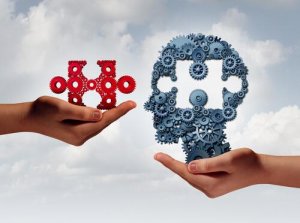Developing Innate and Learned Abilities

People talk a lot about both innate and learned abilities. However, do you really understand what they are? One definition describes these abilities as the skills that enable you to reach a goal.
Abilities can be psychological or physical. There are skills that you’re predisposed to genetically, and others that stem from your environment itself. Thus, some people are born with a special ability to perform a specific task and others learn said ability through training and practice.
Innate and learned abilities
We all have innate abilities. From a young age, certain people have an ideal body type for some sports, others are especially skilled with their hands, some are really good with people, and others are good at school.

If you have an innate ability but don’t develop it, it’s unlikely that the ability will have an impact on your life. Plenty of people are gifted in a particular activity but have never committed themselves to it or developed it in any way. When you see cases like that, you get the feeling that they’re wasting their talent.
Sometimes innate abilities are compromised by things such as trauma, physical disability, intellectual disability, or age. Skills and abilities can deteriorate over time.
Developing individual abilities
In practice, developing different individual skills is conditioned by proportionality with tendencies, persistence, and polarization.
Abilities are the tendency’s instruments because they determine the greater or lesser ability to reach a concrete goal. When we talk about tendencies, we’re talking about the thing you’re trying to achieve.
When the goal takes your skills and weaknesses into account, that’s when it’s easiest to achieve. In that, we could say that you’re acting realistically. You set realistic goals for yourself that you know you can achieve if you make the effort. At the same time, you can develop all the potential related to your responsibility for achieving your goal.
What that means is that you try to achieve goals that are progressively better, because you’re gaining experience and skills as you go. That’s why it’s so important to set some short-term goals that coincide with your current skills and potential.
On the other hand, if your goals don’t relate to your skills and abilities in some way, you are at a much higher risk of failure. When this happens, people usually feel frustrated and tempted to quit.
On the other end of the spectrum is what happens when the goals and objectives are too simple, too easy. You won’t develop as many aptitudes as you might have, so you end up on an intellectually inferior level.
That’s why it’s so important to know what your abilities are. Once you’re aware of them, it’s your responsibility to keep them polished and shiny.
Persistence is essential for developing your skills
Persistence is another important factor. Long-term objectives are always full of setbacks. Two steps forward, one step back. There are moments of great faith and others of desperation. That’s when it seems like everything will fall apart.
One way to be more consistent is remembering why you do the things you do. This is important so that your obstacles don’t demotivate you.

Remember that you have to focus your efforts in a particular direction. You should be working towards goals that relate to your professional life. If your goals are too far-reaching or scattered, you’ll have a hard time achieving them. Your time is limited which is why you have to choose the skills you want to develop to the detriment of others.
Sometimes, people get stuck trying to make a decision. They go back and forth between what’s good for them, what others want, and what others think is best.
We aren’t talking about extreme specialization. It’s about using your time and your energy wisely to develop whatever skill you decide is the right one. If you try to develop more than one at the same time, you’ll get overwhelmed. There’s more information available every day on nearly every subject imaginable, and it’s more than even the most dedicated person could handle.
As you can see, developing your innate and learned abilities depends on the proportionality of tendencies, persistence, and polarization. If you keep these factors in mind, you’ll be able to develop your habits in an intelligent way and maximize your potential.
This text is provided for informational purposes only and does not replace consultation with a professional. If in doubt, consult your specialist.








